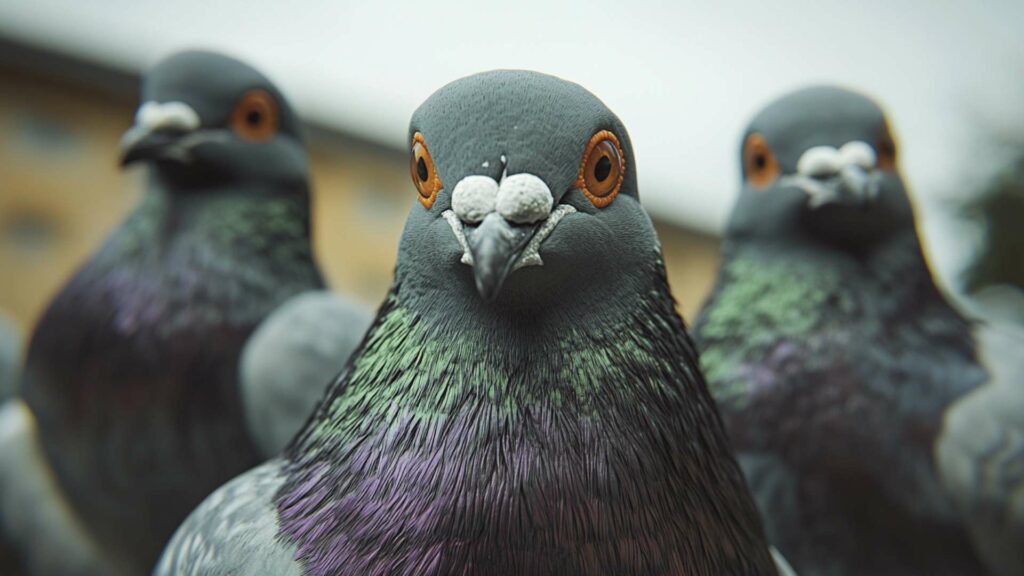When it comes to eggs, the world is well-acquainted with the humble baked chicken egg, a staple in our meals. However, there exists a lesser-known delicacy that has captured the curiosity of adventurous food enthusiasts—the pigeon egg. Yes, you heard it right!
Those seemingly insignificant eggs laid by pigeons hold a gastronomic potential worth exploring. While pigeon meat is not uncommon in certain cultures, their eggs often remain overlooked and misconstrued due to various myths and misconceptions.
The Misunderstood Gems

It’s essential to debunk some common misconceptions surrounding the consumption of pigeon eggs before we delve further into their culinary potential. One prevalent myth suggests that pigeons are classified as pests or carriers of harmful bacteria, thereby rendering their eggs unsafe for human consumption.
However, it’s crucial to note that when raised domestically or collected from clean urban environments, pigeon eggs are no different from other commercially available bird’s eggs—safe and nutritious. So let us shed these preconceived notions and embark on an exploration of the world of pigeon eggs—a world brimming with unique flavors and culinary possibilities!
Nutritional Value and Culinary Uses

When it comes to nutritional value, pigeon eggs hold their own against the more popular chicken eggs. Pigeon eggs are packed with essential nutrients, making them a healthy addition to any diet. Similar to chicken eggs, pigeon eggs are a great source of high-quality protein, which is vital for building and repairing tissues in our bodies.
Additionally, they contain essential vitamins such as vitamin B12 and vitamin D, as well as minerals like iron and selenium. While the exact nutritional composition of hen, may vary slightly between species and diet, pigeon eggs generally offer a similar nutrient profile to that of their poultry counterparts.
Culinary applications and unique flavors of pigeon eggs in various cuisines
Pigeon eggs have long been incorporated into diverse culinary traditions around the world due to their distinct flavor profile. These small delicacies have a rich taste with hints of both sweetness and earthiness that sets them apart from other types of bird eggs. In Asian cuisine, particularly Chinese and Vietnamese dishes, pigeon eggs are often used in soups, boiled or steamed alongside vegetables for an added protein boost.
In some cultures, they are even considered a luxury ingredient in cooking due to their rarity. The versatility of pigeon eggs extends beyond traditional recipes – they can also be pickled or used as an exciting twist on deviled or scrambled eggs for those who seek adventurous culinary experiences.
Incorporating these edible gems into your meals can introduce new dimensions of flavor while providing essential nutrients necessary for maintaining a balanced diet. So go ahead, and explore different cultural cuisines and foods that embrace this unique ingredient – you may discover a delightful addition to your culinary repertoire!
Insights into the Process of Collecting Pigeon Eggs

Now, let’s delve into the fascinating realm of collecting pigeon eggs. Unlike your typical chicken eggs that you find neatly arranged in a cozy nesting box, pigeon eggs require a bit more adventure to acquire.
Pigeons, being free-spirited creatures, often choose unconventional spots to lay their precious eggs. These resourceful birds are known to build their nests in hidden nooks and crannies such as building ledges, tree branches, or even on window sills.
To get your hands on these delicate treasures, one must navigate through urban landscapes or venture into rural areas where pigeons tend to thrive. Climbing up stairs or using special tools like telescopic poles might become necessary skills for the intrepid goose egg collector.
Once you locate a pigeon’s nest with its little bundle of joy—the pigeon egg—gentle and careful handling is crucial. Remember, these tiny yet magnificent creations are incredibly fragile!
Seasonality and Regional Availability of Pigeon Eggs
Pigeon eggs have their own rhythm and schedule when it comes to availability throughout the year. In general, pigeons tend to lay eggs during the spring and summer months when food sources are abundant and temperatures are favorable for hatching. However, it is important to note that regional variations exist due to climate differences worldwide.
In urban environments where pigeons have adapted well to human presence, they may breed all year round due to access to an almost constant supply of food from city dwellers who can’t resist feeding them crumbs from their sandwiches! On the other hand, in more rural or natural habitats where pigeons rely on natural food sources such as grains and vegetables found in fields or forests rather than handouts from humans,
Potential Health Benefits Associated with Consuming Pigeon Eggs
While pigeon eggs may not be as commonly consumed as chicken eggs, they offer a range of potential health benefits that should not be overlooked. Pigeon eggs are rich in essential nutrients such as protein, vitamins, and minerals.
They are particularly known for their high protein content, which is crucial for muscle repair and growth. Additionally, pigeon eggs contain important vitamins like vitamin B12 and folate, which play key roles in energy production and supporting a healthy nervous system.
Allergies, Sensitivities, and Dietary Restrictions to Be Mindful Of

As with any type of food, it is important to take into account potential allergies, sensitivities, or dietary restrictions when consuming pigeon eggs. While allergies to pigeon eggs are relatively rare compared to other food allergens like shellfish or nuts, it is still possible for some individuals to have an allergic reaction. If you have a known allergy to bird’s eggs or have experienced adverse reactions in the past after consuming other types of bird’s eggs like chicken or duck eggs, it is advisable to exercise caution when trying to eat pigeon eggs.
Furthermore, individuals following specific diets or dietary restrictions should also consider whether pigeon eggs align with their eating habits. For example, if you follow a vegetarian or vegan diet that excludes animal products altogether, consuming any type of egg would not be suitable.
Additionally, it’s worth noting that some people may have difficulty digesting certain types of proteins found in bird’s eggs and might experience digestive discomfort after consumption. It is always recommended to consult with a healthcare professional or registered dietitian if you have any concerns.
Cultural Significance and Historical References
Throughout the world, pigeon eggs have played a role in the culinary traditions of various cultures for centuries. In ancient Egypt, for example, pigeon eggs cooked whole were considered a delicacy and were often consumed by the affluent classes. The Chinese also have a long-standing tradition of eating pigeon eggs, believing that they possess special properties akin to animal ginseng that can enhance one’s health.
In some Middle Eastern countries like Lebanon and Saudi Arabia, pigeon eggs are still highly valued and are incorporated into traditional dishes. The historical significance of pigeon egg consumption showcases its enduring appeal across different civilizations.
Symbolic meanings attached to pigeon eggs in folklore and traditions
Beyond their culinary uses, pigeon eggs hold symbolic meaning in folklore and traditions around the world. In many cultures, pigeons are associated with peace, love, and fidelity. As such, pigeon eggs have come to symbolize new beginnings, fertility, and hope.
In ancient Greece, for instance, releasing pigeons or offering their eggs during religious ceremonies was believed to bring blessings upon individuals or communities. Similarly, in some Native American tribes’ folklore, finding a pigeon egg was seen as an omen of good luck or an indication of upcoming prosperity.
These symbolic associations further add to the allure surrounding these petite wonders from nature’s nest. Incorporate phrases: protein-rich delicacy; shell as fragile as whispers; raise pigeons for their eggs; taste unique to pigeon eggs; cooking methods vary across different cultures; historical importance of eating pigeon eggs
Ethical Concerns and Conservation Efforts

When considering the consumption of pigeon eggs, it is imperative to address the ethical aspects surrounding their collection. Harvesting wild pigeon eggs raises concerns about disturbing nesting sites and potentially harming bird populations. Many conservationists argue that interfering with natural processes to eat pigeons, can disrupt ecological balance.
Pigeons, like many other birds, have intricate nesting rituals and rely on their eggs to ensure future generations. Therefore, it becomes essential to exercise caution and mindful decision-making when collecting pigeon eggs.
Preserving Nature’s Harmony: Conservation efforts aimed at protecting pigeons while ensuring sustainable egg harvesting practices
Efforts have been made worldwide to protect pigeons and their habitats while also advocating for sustainable egg harvesting practices. Conservation organizations work diligently to educate communities about responsible egg collection methods that minimize harm to both pigeons and their ecosystems.
By fostering awareness about the delicate balance between human activities and nature, these organizations promote environmentally friendly practices that safeguard the continuing existence of these magnificent birds. By implementing guidelines for egg collectors and raising awareness among local communities, conservation efforts strive to strike a harmonious balance between human consumption desires and bird preservation needs.
Through these collective endeavors, we can ensure the long-term sustainability of pigeon populations while respecting ethical considerations surrounding their eggs’ collection. So next time you come across a discussion regarding consuming pigeon eggs, remember the crucial importance of maintaining ecological harmony alongside our culinary explorations.
Unusual Facts about Pigeon Eggs
Pigeon eggs may not be as well-known as their chicken counterparts, but they hold a charm of their own. These petite treasures are usually around 1.5 to 2 inches in length and have a smooth and glossy shell. Unlike chicken eggs that come in various colors like egg white, brown, or even blue, pigeon eggs are typically white or off-white in color.
One interesting fact is that pigeon eggs have a slightly elongated shape compared to the typical oval shape of other bird’s eggs. This unique feature makes them stand out when compared to the more commonly eaten and consumed eggs.
Unique features that distinguish them from other types of bird’s eggs
One distinguishing characteristic of pigeon eggs is their delicate nature. The eggshells are notably thinner than those of chickens or geese, making them easier to crack open with less force. Additionally, pigeon egg yolks tend to be richer and creamier than those found in other bird species’ eggs.
Their flavor profile is often described as being buttery and slightly gamey. Due to this richness, pigeon eggs are highly valued by chefs and food enthusiasts who enjoy cooking and experimenting with new flavors.
It’s intriguing how these tiny marvels offer such distinct attributes despite being overshadowed by more popular choices like chicken or duck eggs on the culinary scene. Overall, while most people may not be aware of these fascinating aspects related to pigeon eggs’ appearance and characteristics, delving into the world of lesser-known edible delicacies can uncover hidden gems like these little wonders from pigeons’ nests.
Conclusion
After delving into the fascinating realm of pigeon eggs, it becomes evident that these petite marvels have a lot to offer. Despite the common misconceptions surrounding their consumption, pigeon eggs are not only edible but also boast a unique flavor profile that sets them apart from their more popular fried chicken counterparts.
Nutritious and versatile, they have found their place in various cuisines across the globe. However, it is crucial to approach their collection ethically, respecting conservation efforts and ensuring sustainable practices.
Pigeon eggs pack a nutritional punch comparable to chicken eggs, making them a viable option for those seeking alternative protein sources. Additionally, they have an intriguing culinary application due to their distinct taste profile.
Throughout history, different cultures have embraced pigeon eggs as an important part of their culinary traditions and even assigned symbolic meanings to them in folklore and traditions. While the idea of consuming pigeon eggs may raise ethical concerns for animal lovers or conservationists, responsible harvesting practices can address these apprehensions.
By supporting efforts to protect pigeons and promote sustainable egg collection methods, we can strike a balance between enjoying this unique food source and preserving the well-being of these remarkable birds. While pigeon egg consumption may not be commonplace in most people’s diets today, this article has shed light on its culinary potential and nutritional value.
By debunking myths surrounding fake pigeon eggs, or dangers associated with eating bird’s nests or meat from pigeons raised for consumption specifically, we can appreciate the potential benefits that come with incorporating pigeon eggs into our meals. So let us embrace new flavors and explore the world of gastronomy by giving these little gems a try!
Guard Against Pigeons with D-Termination: Las Vegas’ Top Pest Control Choice!

If pigeon problems are a concern for you, look no further than D-Termination. Our experienced team specializes in pigeon deterrence and the restoration of cleanliness and integrity in your space. Bid farewell to pigeons by selecting D-Termination for highly effective pest control today!
Contact us at 702-919-6310 or visit dtermination.com to schedule your pigeon control service and reclaim your space from these unwelcome pests.
Frequently Asked Questions:
Pigeon eggs are edible, but they are not commonly consumed.
Avoid eating the eggs of endangered or protected bird species.
It’s best not to touch pigeon eggs to prevent potential abandonment by the parents.
Pigeon eggs can be cooked in the same way as chicken eggs, by boiling, frying, or scrambling.








